In this post, I’m going to discuss three Christian views of creation (young earth creationism, old earth creationism and theistic evolution) with the goal of identifying points of agreement and points of tension with each other and with the view from science discussed in my previous posts. I’m also going to compare the Christian views with philosophical naturalism, a world-view that is often confused with the scientific view. A comparison of these views is shown in the table.
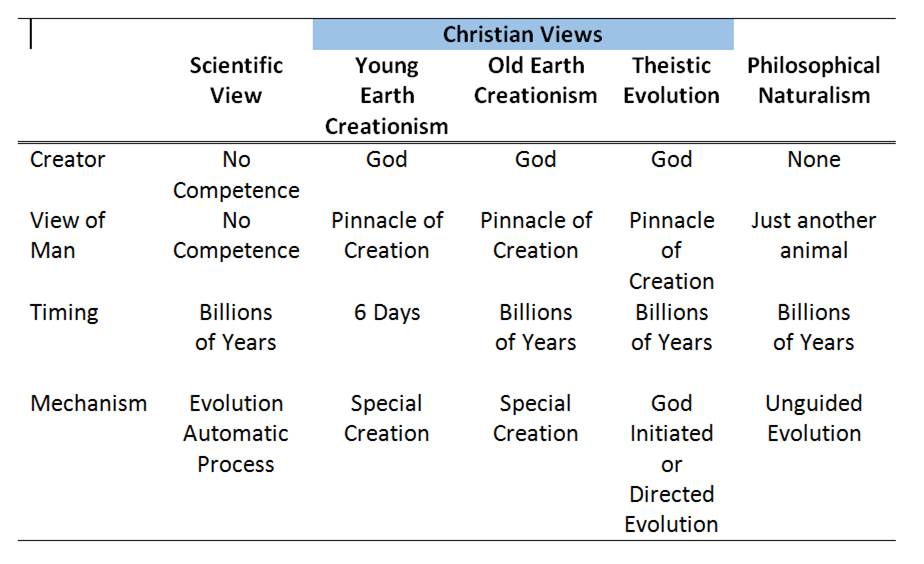
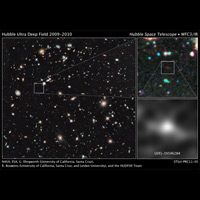
Scientific View. The dominant scientific view of the timing of events in natural history is the Big Bang theory which holds that the universe began as an infinitely dense and infinitely hot singularity that then developed over time through processes of cosmic, chemical and biological evolution. The scientific evidence indicates that the universe and the earth are very old (billions of years). The fact that multiple independent methods for estimating these ages give similar results provides strong support for this conclusion. It should be noted, however, that science has no explanation for the origin of the singularity that was present at the beginning. The Big Bang theory agrees with the Christian view that the universe had a beginning. For more details see Timing of Creation Events – The View from Science (Post 4).
The theory of evolution by natural selection is the dominant scientific view of the mechanism that underlies the evolution of life on earth. It is the mechanism that drives evolution and explains the observations of changes in life over time as well as the common ancestry of all living things. It is an adaptive mechanism that allows populations of organisms to optimize their fit to their environment, adapt to changes in their environment and explore different ecological spaces which provide new resources for the population. It is an automatic process that takes of advantage of genetic diversity in the population and selects on the basis of reproductive fitness. For more details see the series on The mechanism of creation the view from science (Posts 6-8).
Young Earth Creationism (YEC). This view is also known as scientific creationism. Polls show that this is the most popular view among American Protestants. Young Earth Creationists view science and the Bible as overlapping domains of knowledge. Where there is tension between the two views as in Genesis 1 the Bible wins. They see the Bible is the only reliable source of knowledge about the origin of the earth and of the universe. They believe that the Bible teaches that the earth and the universe were created over six 24-hour days.

The YEC view also differs from the main-stream science view in how YEC interprets the scientific data related to the mechanism of creation. For example where main-stream scientists look at the layers of the geological strata as evidence that can be used to see the history of life, YEC proponents argue that all the layers were lay down within one year as a result of the flood of Genesis. Mainstream scientists would argue that the pattern of life in the geological strata is not consistent with what one would expect from a great flood.
Thus there is tension between the view from science and the YEC view in both the mechanism and timing of the creation events. In terms of the two sources of God’s revelation mentioned above, the young earth creation view sees the source of tension as faulty interpretation of God’s revelation in nature (i.e. scientific interpretation). On the other hand, science for methodological reasons ignores God’s revelation in scripture.
Currently Ken Ham and others at Answers in Genesis are the most well-known proponents of the YEC view.
Old Earth Creation (OEC). This view is also known as concordism or progressive creationism. Both of these latter terms were coined by the late Baptist theologian Bernard Ramm in the 1950’s. As Ramm defined it, concordism
seeks a harmony of the geologic record with the days of Genesis. The harmony is achieved by viewing the days of Genesis 1 as ages or days that begin the geological ages. The term progressive creation came from Ramm’s belief that “the fundamental pattern of creation was progressive.

This is consistent with the scientific view of the pattern in the fossil record but the progressive creation view sees the origin of the life forms in the fossil record as due to millions of acts of special creation rather than the process of evolution by natural selection.
Currently Hugh Ross and Fuzz Rana at Reasons to Believe Ministries are the best known proponents of the OEC view.
Theistic Evolution (TE). This view accepts the science underlying both the timing and mechanism (i.e. evolution) of creation. With respect to the timing they typically use the Literary Framework view although the Day-Age view and John Walton’s Cosmic Temple view are also consistent with the view from science. The Literary Framework view sees the days of Genesis as a literary device rather than 24-hour days. The first three days describes spaces that were created by God and the last three days describe the filling of those spaces. For more details see Timing of Creation Events – The View from the Bible (Post 5).
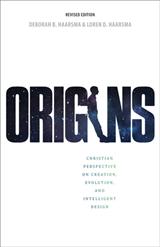
With respect to mechanism, this view sees God as the creator of space, time, energy and matter as well as the laws of nature that govern evolution and other natural processes. However, there are differences within the theistic evolution community with regard to God’s role after the initial Big Bang creation event. Some would see God continuously involved in guiding the evolutionary process whereas others would see God allowing evolution to proceed without further intervention by God or see the final outcome of evolution built into the laws of nature. Examples of the proponents of these different theistic evolution communities are Debra and Loren Haarsma, John Haught and Francis Collins, respectively. For more details about this see Gerald Rau’s Mapping the Origins Debate: Six Models of the Beginning of Everything (InterVarsity Press, 2012). I’ll have more to say about these differences in a later post where I will talk about the question of whether evolution is compatible with belief in God as creator.
Some additional thoughts about the different Christian views of creation.
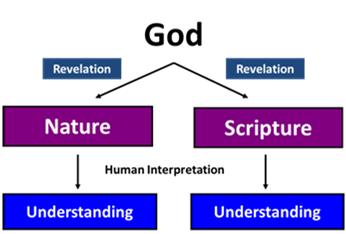
- In the first post in this series I pointed out that God reveals himself to man in two ways: through scripture and through nature. Science is the method of choice for studying nature. Because they are from God both sources of revelation must both be true and there cannot be any real conflict between them. But human understanding of these revelations requires human interpretation. The differences among the three Christian views of creation are due to the fact that they interpret God’s revelations in nature and in scripture in different ways. The YEC view believes that their interpretation of scripture is correct while main-stream science’s interpretation of God’s revelation in nature is faulty. At the other extreme, the Theistic Evolution view believes that the main-stream science interpretation of nature is correct but the YEC interpretation of scripture is faulty. The OEC view is intermediate between these extremes. The OEC view accepts the main-stream science understanding of the timing of the creation events and reconciles it with Scripture using the day-age interpretation of Genesis 1. However, for the mechanism of creation, the OEC view sees main-stream science as a faulty interpretation of God’s revelation in nature.
- In the third post of this series, I pointed out that the Genesis account of creation is set within the context of an ancient near eastern understanding of the Cosmos. Because of this I concluded that the Genesis account does not intend to teach modern science but rather that God is speaking to his people in terms that they can understand. This raises questions about the YEC view that the Bible is a more reliable source of knowledge about the origin of the earth and of the universe than the findings of main-stream science. Similarly OEC view seeks to find harmony between the days of creation in Genesis 1 and the events in natural history revealed by modern science.
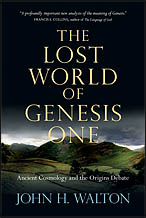
- In the fifth post in this series, I talked about the fact that there is no consensus among conservative scholars about the meaning of the days of Genesis 1. Yet a significant source of the tension between the three views of creation discussed in this post is due to these differences. Young earth creationists favor the 24-hour day view, old earth creationists favor the day-age view, while theistic evolutionists favor the literary framework view. John Walton’s cosmic temple view sees creation occurring over a period of seven 24-hour days but he believes that “creation” in Genesis 1-2:3 is about installing functions rather than material creation. So it seems that we need to be careful about being too dogmatic about the interpretation of Genesis 1.
Philosophical Naturalism. The view from science is sometimes confused with a world-view called philosophical naturalism. When studying a scientific phenomenon scientists make the assumption that the phenomenon being studied has a natural explanation. This assumption or presupposition is called methodological naturalism. This assumption recognizes that the competence of science lies in the study of natural processes and that science is not competent to weigh in on the question of God and his possible involvement in these processes. Before I was a Christian I made this assumption in my research and I continued to make the assumption after I became a Christian. Some scientists turn the methodological naturalism assumption into a belief that all natural phenomena have a natural explanation. This belief is called philosophical naturalism.
Philosophical naturalism shares the science view of the timing and mechanism of events in natural history. But differs from the science view in believing that either God does not exist or at least that he has no role in any natural process. In contrast science is not competent to draw conclusions about the supernatural and thus has nothing to say about God’s role as creator or about the Christian view that man is the pinnacle of creation and thus is neutral with respect to the question of God.
Conclusion. In the second post in this series I concluded that main message of Genesis 1 is that God is the creator and that man is the pinnacle of his creation. These two themes are seen over and over again in other creation passages in both the Old and New Testaments. While the three views of creation discussed in this post differ in their interpretation of the timing and mechanism of creation events they all agree that God is the creator and that man is the pinnacle of his creation. This is in marked contrast to the view of philosophical naturalism that believes that there is no Creator God and that man is simply another animal that arose through the process of evolution as a matter of chance. In my opinion, conflict between the Christian world-view and the philosophical naturalism world-view is without a doubt much more important than Christian arguments among themselves over the interpretation of Genesis 1.
Looking ahead: Because Young Earth Creationism and Old Earth Creationism disagree with the scientific account of the mechanism of creation we need to ask is evolution true? Perhaps the strongest recent challenge to evolution has been the Intelligent Design movement. In my next post we look at Intelligent Design and ask if it is a better explanation than the scientific view of evolution by natural selection.
Questions for further reflection:
- Which of the three Christian views of creation do you favor? Or do you favor the philosophical naturalism view? Why?
- How do you assess the relative importance of the conflict between the Christian world-view and the philosophical naturalism world-view compared with Christian tensions over differences in the interpretation of Genesis 1.
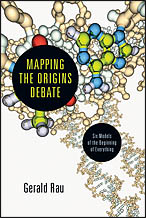
Suggestions for further reading:
- Mapping the Origins Debate: Six Models of the Beginning of Everything, Gerald Rau. InterVarsity Press, 2012.
- Science and the Bible: Five Approaches, BioLogos Blog Series by Ted Davis.
- Finding Darwin’s God: A Scientist’s Search for Common Ground between God and Evolution, Kenneth R. Miller. Harper Collins, 2007.
- Three Views on Creation and Evolution, J. P. Moreland and John Mark Reynolds, General Editors. Zondervan, 1999.
- Added by the editor: PDF with the titles and links to the posts in Tom Ingebritsen‘s Christianity and Science series. Yes, this was created to meet the requests of readers and will be updated. Your interest in and encouragement of this series is much appreciated. (Updated: 4/1/2014. 11:06 pm).
Notes added by the editor:
- Gerald A. Rau (Ph.D., Cornell) is founder and chief editor at Professional English International, Inc., a team providing high quality editing services in English academic writing, based at National Chung Cheng University in Chiayi, Taiwan. He was previously an adjunct professor teaching biology courses at Wheaton College in Wheaton, IL and at Trinity Christian College in Palos Heights, IL. Rau has an impressive history of education with degrees in Biology, Science Education, Horticulture, Plant Breeding, Vegetable crops and International Agriculture, which are all subjects he continues to include in his writings as an independent scholar. — From the Author page for Mapping the Origins Debate. Accessed 3/4/2014. ↩
Tom Ingebritsen is an Associate Professor Emeritus in the Dept. of Genetics, Development and Cell Biology at Iowa State University. Since retiring from Iowa State in 2010 he has served as a Campus Staff Member with InterVarsity Graduate & Faculty Ministry at Iowa State University

Excellent summary. There are biblical issues at stake such as a singular Adam and Eve in Romans 5. What does it mean that “death entered the world” if one holds to OEC or TE.
At the risk of stealing Tom’s thunder (he has done an excellent job with this series), let me venture a reply.
OEC and TE believe that “death entered the world” refers to spiritual death. They point out that Romans 6 talks about being dead to sin, and dying with Christ, both obviously referring to spiritual rather than physical conditions. Particularly, Romans 6:23 says, “For the wages of sin is death, but the gift of God is eternal life in Christ Jesus our Lord.” Eternal life obviously does not mean eternal physical life in this world, so logically death, the wages of sin, does not refer to physical death either.
On the question of a singular Adam, Paul several times refers to Adam as a singular person (Romans 5, I Cor 15, I Tim 2). OEC believes in a singular Adam, created separately perhaps 500,000 years ago, but TE believes there was no singular individual. The justification given is that we often speak of individuals in stories as if they were real, even if we know they are not. If I were to ask you what happened to Romeo and Juliet, you could probably tell me, but would not find it necessary to remind me that it was not a historical account. Many pastors have used stories in sermons to make a point, without implying their historicity.
On the other hand, it may not be necessary to give up a singular Adam in an evolutionary account. A relatively small but growing number of biologists are examining mechanisms for evolution that would allow major changes to occur rapidly, perhaps even in a single generation. I believe such non-Darwinian mechanisms may allow for a historical Adam within an evolutionary model, and hope to be able to present such a model soon.
I appreciate your excellent book about the different Christian views of creation. It was very helpful as I prepared my blog. I highly recommend it for those who would like a more in depth treatment of the topic. I’d also enjoy hearing more about the non-Darwinian mechanism for human evolution that you mentioned at the end of your response.
Tom,
I hope to publish something on it within a year. I will be presenting some of my preliminary ideas and talking them over with other biologists when I speak at the Wheaton ASA meeting on April 10. Sneak preview: the things we know so far that separate humans from apes include a chromosome fusion, several inversions, high activity of transposable elements, especially in genes related to brain development, duplication of SRGAP (related to cortical size and function), changes in FOXP2 (related to speech). Whether any of those were related events (fusion and inversions often lead to increased transposition events) that might have caused near immediate speciation is what I am working on.
David & Gerald-
Thanks for joining the conversation.
David, you raise two excellent and important questions. I will be writing one or two blogs about the question of Adam and Eve and whether the Biblical account can be reconciled with the science. So I’d like to wait to comment further until then.
Gerald, I appreciate and agree with your comments about the two questions. I would add that the BioLogos Forum has a post about the question: “Did death occur before the fall?” That post goes into more detail about the question and the theistic evolution perspective. Here is the link to that post: http://biologos.org/questions/death-before-the-fall
biblical and scientific stands might have misunderstanding. in my point of view they’re both correct perhaps it just a matter of how they understand the concept.
earth might be a billion years and a thousand years of age respectively. the earth in his early age revolves faster around the sun (a speed of light) it might age thousand times every minute thus makes the earth particles (atomic structures and isotopes) decayed faster which now our bases of earth age. take note that 2Peter 3:8 stated that a day of the Lord is a thousand years to us (human).
As a YEC, it seems to me that Genesis 1 affirms humans’ everyday most natural broad sense of things. This sense of things is about how the entire cosmos mystically affirms (1) water-based life, (2) the Earth’s role in the support of that life, and (3) human cosmological discovery and progress.
Even cosmic physics has been empirically discovered to be finely tuned for these two values. So, while it is not false to say that God created space, matter and such, saying so is an informationally ‘bottom, up’ way of getting to the Divine Design *reality* of space, matter and such (some YEC’s think Genesis 1 begins and proceeds explicitly of such things). For, imagine we were to verbally introduce to the wedding guests the bride’s specially made wedding dress by not even mentioning the dress until after we had ‘pointed out’ the ‘glorious’ fact that ‘everything ultimately is made of the’ same blandly secular ‘stuff as everything else.’
So, so what, that God made space, matter and such? Why not put the best foot forward? Why not focus, in the first place, on the life-affirming Divine Design relationship between the general cosmos and the special Earth? Like this:
1. the general cosmos and the special Earth.
  2. The Earth, as its own general subject, implying that which we all intuit is most valuable about the Earth unto itself in all the cosmos: its abiding maximal abundance of open liquid water.
    3. that water and its special relation to the Sun’s light, hence the water cycle;
      4. The water cycle and its special beneficiary and member, biology;
        5. biology and its special category, animal biology (plant/animal/mineral = animal);
          6. Animal biology and its special category, human;
7. The man and his wife (Genesis 2:21-23)
So this seven-fold recursion shows that, contrary to either a godless or a Platonic outlook, Genesis 1:1 can be seen to be entirely concerned to affirm the fact that, since the Living God designed and created us, we not only are not insignificant, we are the central value of the entire account and of the entire cosmos. For, this view of v. 1 sets the theme for the rest of the account.
Even more, this seven-fold recursion fits the fact that the account conspicuously lacks mention of any material origin for humans, and only for humans. This uniquely human lack of such mention at once (A) poses humans as transcending the Earth and (B) as implying that such mention is to be anticipated, as a completion to the first chapter. Per 7, this anticipation is fulfilled in Genesis chapter 2.
—
Q: Why six days? A: Irreducible complexity of living systems:
An automobile does not require being made in any particular sequence, nor in short order. This is because its engine does not naturally require being run in order for it to be made. By contrast, the main subsystems of the Earth’s ecology are not just ‘machines’. Rather, they are living organisms. This means each subsystem naturally requires being run in order to be assembled one to another. This is especially the case for the global flora system and the two fauna systems. And they have no natural ‘off’ mode.
So, basically, Genesis 1 shows how Earth’s ecology can be known to function as an irreducibly complex system.